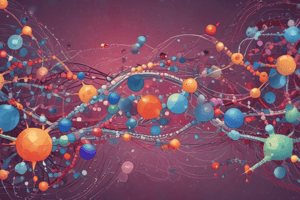Podcast
Questions and Answers
What role does P53 play in cell regulation?
What role does P53 play in cell regulation?
- It promotes sustained proliferative signaling.
- It causes mutation leading to genome instability.
- It inhibits apoptosis by increasing BCL-2.
- It protects and controls cell growth. (correct)
Which of the following is NOT a characteristic of cancer cells?
Which of the following is NOT a characteristic of cancer cells?
- Evading growth suppressors.
- Exhibiting normal apoptosis. (correct)
- Resisting cell death.
- Sustained proliferative signaling.
What is the role of BAX in apoptosis?
What is the role of BAX in apoptosis?
- It inhibits cell division.
- It promotes survival of damaged cells.
- It promotes apoptosis. (correct)
- It suppresses tumor growth.
How do cancer cells achieve sustained proliferative signaling?
How do cancer cells achieve sustained proliferative signaling?
Which mechanism does not contribute to genome instability in cancer cells?
Which mechanism does not contribute to genome instability in cancer cells?
What effect does BCL-2 have in relation to apoptosis?
What effect does BCL-2 have in relation to apoptosis?
What is a key feature that distinguishes cancer cells from normal cells?
What is a key feature that distinguishes cancer cells from normal cells?
Which of the following accurately describes a function of RB protein?
Which of the following accurately describes a function of RB protein?
Flashcards
Evading Growth Suppressors
Evading Growth Suppressors
The ability of cells to escape normal growth control mechanisms, allowing for uncontrolled proliferation.
Apoptosis
Apoptosis
The process by which cells are programmed to self-destruct, preventing the accumulation of damaged or dangerous cells.
BCL-2 Family Proteins
BCL-2 Family Proteins
Proteins that control the activation of apoptosis.
p53
p53
Signup and view all the flashcards
Inhibiting Apoptosis
Inhibiting Apoptosis
Signup and view all the flashcards
Resisting Cell Death
Resisting Cell Death
Signup and view all the flashcards
Mutations
Mutations
Signup and view all the flashcards
Sustained Proliferative Signalling
Sustained Proliferative Signalling
Signup and view all the flashcards
Study Notes
Learning Objectives
- Describe the main biological features of cancer cells
- Understand how mutations affect protein and cell behavior
- Details the roles of oncogenes and tumor suppressor genes in cell proliferation and death
What is Cancer?
- Cancer is a group of over 200 diseases
- Characterized by uncontrolled, abnormal cell growth
- Life-threatening if untreated
- Driven by genetic mutations
Hallmarks of Cancer
- Genome instability and mutation
- Resisting cell death
- Evading growth suppressors
- Sustained proliferative signaling
Cancer Caused by Mutations
- Mutations can change bases, increase promoter activity, and affect protein function
- Changes affect transcription factors influencing promoter activity and protein function
Cancer Genes
Proto-Oncogenes
- Normal genes involved in cell growth
- Mutations can transform them into oncogenes, driving cancer cell growth
- Examples include c-Myc and K-Ras
Oncogenes
- Mutated forms of proto-oncogenes
- Drive cancer cell growth
- Examples include activating mutations in K-Ras (found in 30-50% of colorectal cancers) and mutations of c-myc (in most Burkitt lymphoma cases)
Myc Oncogenes
- Transcription factors upregulated in response to oncogenic stimuli
- Consist of three family members (c-Myc, N-Myc, and L-Myc)
- Mutations lead to excessive Myc protein and overactivity, promoting cancer
- Amplification of the N-Myc gene is associated with poor prognosis in childhood glioblastoma
Ras GTPase
- Small GTPase proteins (N-Ras, K-Ras, H-Ras)
- Active when bound to GTP
- Crucial for activating the MAP Kinase pathway
- Mutations of Ras are common in cancers (e.g., 20-30% of colorectal cancers)
Signaling Pathways from EGFR
- Elaborate signaling pathway starting with EGF
- Involves multiple proteins (Shc, Ras, SOS, Grb2, PI3K, PIP2, PLCγ, DAG, IP3, PKC, Raf, MEK, ERK, NF-κB, Akt, Calcineurin, NEKB)
- Leads to downstream effects, including gene expression
Tumor Suppressor Genes
- Inhibit cell growth and function
- Mutations can contribute to uncontrolled cell division and cancer
- Examples include RB1 and TP53
DNA Repair/Stability Genes
- Maintain DNA stability and repair mutations
- Mutations in these genes can lead to accumulating mutations and increase cancer risk
- Examples include BRCA1 and BRCA2
TP53 and P53
- TP53 gene encodes the transcription factor P53 (tumor protein 53)
- One of the most commonly mutated genes in cancers
- Acts as a tumor suppressor, regulating genes involved in proliferation and apoptosis preventing cancer formation
- Often mutated or not functional in cancers where it can't regulate proliferation or apoptosis
Programmed Cell Death (Apoptosis)
- A natural cell death process
- Extrinsic pathway—external signals trigger apoptosis
- Intrinsic pathway—internal stress signals trigger apoptosis
- Critical for maintaining cellular homeostasis and eliminating damaged or unwanted cells.
RB1 (Retinoblastoma)
- Inhibits E2F transcription factors and cell cycle progression
- Phosphorylation inactivates RB1
BCL-2 Proteins
- Regulate apoptosis
- Some (e.g., BCL-2) inhibit apoptosis, others (e.g., Bax) promote it.
- Mutations could lead to altered apoptosis regulation and impact cancer development
Studying That Suits You
Use AI to generate personalized quizzes and flashcards to suit your learning preferences.




